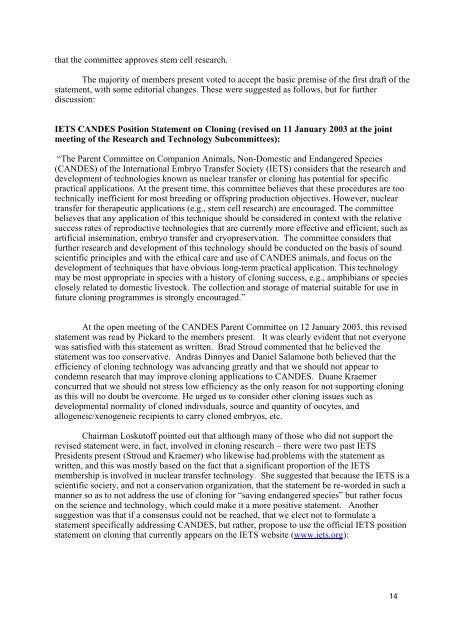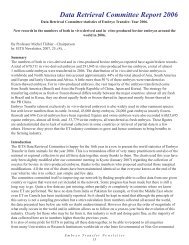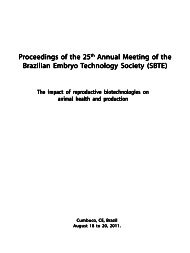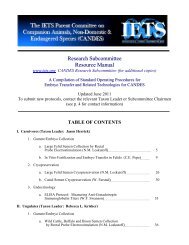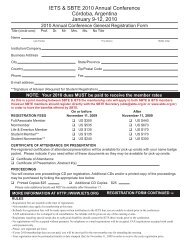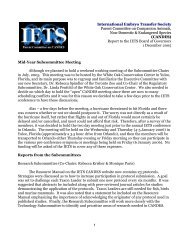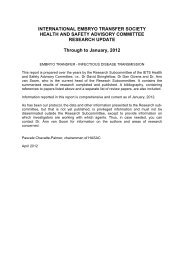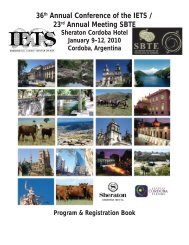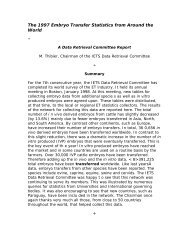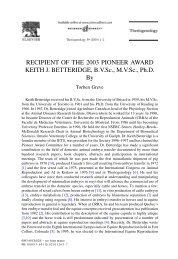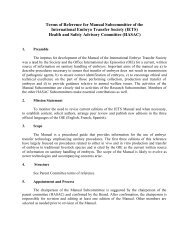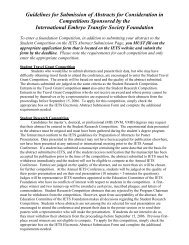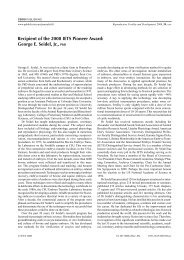January 2003 - International Embryo Transfer Society
January 2003 - International Embryo Transfer Society
January 2003 - International Embryo Transfer Society
Create successful ePaper yourself
Turn your PDF publications into a flip-book with our unique Google optimized e-Paper software.
that the committee approves stem cell research.<br />
The majority of members present voted to accept the basic premise of the first draft of the<br />
statement, with some editorial changes. These were suggested as follows, but for further<br />
discussion:<br />
IETS CANDES Position Statement on Cloning (revised on 11 <strong>January</strong> <strong>2003</strong> at the joint<br />
meeting of the Research and Technology Subcommittees):<br />
“The Parent Committee on Companion Animals, Non-Domestic and Endangered Species<br />
(CANDES) of the <strong>International</strong> <strong>Embryo</strong> <strong>Transfer</strong> <strong>Society</strong> (IETS) considers that the research and<br />
development of technologies known as nuclear transfer or cloning has potential for specific<br />
practical applications. At the present time, this committee believes that these procedures are too<br />
technically inefficient for most breeding or offspring production objectives. However, nuclear<br />
transfer for therapeutic applications (e.g., stem cell research) are encouraged. The committee<br />
believes that any application of this technique should be considered in context with the relative<br />
success rates of reproductive technologies that are currently more effective and efficient, such as<br />
artificial insemination, embryo transfer and cryopreservation. The committee considers that<br />
further research and development of this technology should be conducted on the basis of sound<br />
scientific principles and with the ethical care and use of CANDES animals, and focus on the<br />
development of techniques that have obvious long-term practical application. This technology<br />
may be most appropriate in species with a history of cloning success, e.g., amphibians or species<br />
closely related to domestic livestock. The collection and storage of material suitable for use in<br />
future cloning programmes is strongly encouraged.”<br />
At the open meeting of the CANDES Parent Committee on 12 <strong>January</strong> <strong>2003</strong>, this revised<br />
statement was read by Pickard to the members present. It was clearly evident that not everyone<br />
was satisfied with this statement as written. Brad Stroud commented that he believed the<br />
statement was too conservative. Andras Dinnyes and Daniel Salamone both believed that the<br />
efficiency of cloning technology was advancing greatly and that we should not appear to<br />
condemn research that may improve cloning applications to CANDES. Duane Kraemer<br />
concurred that we should not stress low efficiency as the only reason for not supporting cloning<br />
as this will no doubt be overcome. He urged us to consider other cloning issues such as<br />
developmental normality of cloned individuals, source and quantity of oocytes, and<br />
allogeneic/xenogeneic recipients to carry cloned embryos, etc.<br />
Chairman Loskutoff pointed out that although many of those who did not support the<br />
revised statement were, in fact, involved in cloning research – there were two past IETS<br />
Presidents present (Stroud and Kraemer) who likewise had problems with the statement as<br />
written, and this was mostly based on the fact that a significant proportion of the IETS<br />
membership is involved in nuclear transfer technology. She suggested that because the IETS is a<br />
scientific society, and not a conservation organization, that the statement be re-worded in such a<br />
manner so as to not address the use of cloning for “saving endangered species” but rather focus<br />
on the science and technology, which could make it a more positive statement. Another<br />
suggestion was that if a consensus could not be reached, that we elect not to formulate a<br />
statement specifically addressing CANDES, but rather, propose to use the official IETS position<br />
statement on cloning that currently appears on the IETS website (www.iets.org):<br />
14


